Civil War Intrigue and Reflections: Recent Items from The American Civil War Collection

The July release of The American Civil War Collection, 1860-1922: From the American Antiquarian Society includes a tale of a British plot to destroy democracy, a case of Southern espionage, and a retrospective examination of the Trent Affair. Also found here are popular cultural items such as the history of a famous mid-19th-century singing group and a colorful children’s picture book featuring an advertisement for battle maps and more.
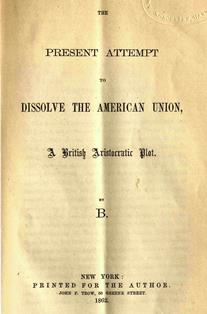
The Present Attempt to Dissolve the American Union: A British Aristocratic Plot (1862)
By B.
As with most conspiracy theories, much of the “supporting evidence” of this plot comes in the form of third- or fourth-hand information. The author, B, refers to a letter describing a conversation between a Mr. Leggett and Deputy Commissary-General Wilson, of the British army. As remembered by Leggett, Wilson had an intriguing perspective on why Great Britain outlawed the slave trade. Acting as an agent of the British Government, Wilson was in Mexico to make financial arrangements connected with payment to West India slaveholders of their portion of the £20,000,000 voted by the British Parliament as compensation for the forced sacrifice of their human property. According to Wilson, the outlawing of the slave trade, and potential economic ruin of the British West India islands, was purely an act of self-interest by the British aristocracy:
Mr. Wilson said that the abolition of slavery in the British colonies would naturally create an enthusiastic anti-slavery sentiment in England and America, and that in America this would in the process of time excite a hostility between the free States and the slave States, which would end in a dissolution of the American Union, and the consequent failure of the grand experiment of democratic government; and the ruin of Democracy in America would be the perpetuation of aristocracy in England.
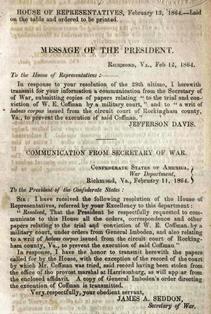
Message of the President, Richmond, Va., Feb. 12, 1864: To the House of Representatives: In Response to Your Resolution of the 29th ultimo, I Herewith Transmit for Your Information a Communication from the Secretary of War, Submitting Copies of Papers Relating “to the trial and conviction of W.E. Coffman by a military court,” and to “a writ of habeas corpus issued by the circuit court of Rockingham county, Va., to prevent the execution of said Coffman” (1864)
By Jefferson Davis
Although the stakes in the Coffman case were not comparable to those of the prohibition of the slave trade, the papers accompanying President Davis’s message are as intriguing as Mr. Wilson’s explanation of the British aristocracy’s true intentions. William Coffman had been captured, tried before a military court, and found guilty of giving intelligence to the Union Army. Confederate General Imboden, intent on Coffman’s execution, ordered Provost Marshal Avis, who was detaining Coffman, to carry out the sentence. However, prior to carrying out the order, Avis was served with a writ of habeas corpus by a civilian court to prevent the execution. Avis informed Imboden of the writ and asked for guidance. Dismissing the civilian court’s jurisdiction, Imboden wrote,
The guilt of the prisoner being clear beyond a doubt, he shall not escape the penalty of his crime on a mere technicality, if I can prevent it. I have, for nearly three years, been exposing my life, as a citizen of Virginia, to defend my home and country against a barbarous foe. This criminal ceased to be entitled to protection of our laws when he took sides with our enemy, and I hold I had the right to hang him as soon as caught, without a trial; but, out of abundant caution, I gave him a trial. He is found guilty. I have sentenced him to death and will hang him. I hold myself responsible before the courts and country for doing what I deemed a righteous act.
Before receiving Imboden’s message, Avis had, again, been given contradictory orders. He wrote back to General Imboden to explain that General Cooper had ordered him to obey the writ. Imboden emphatically replied:
I decline to obey the writ, and now direct you to execute the sentence of death on William E. Coffman, according to the order in his case, at the time therein mentioned. I assume the whole responsibility of the execution, and also the responsibility of ordering you to disregard the writ. A more unmitigated scoundrel was never hung.
Although ultimately Avis obeyed the writ and Coffman was not hanged, the disappearance of the military court records, as described in the affidavit of a clerk in the Provost Marshall’s office, raises intriguing questions not answered here. The clerk, Mr. William Wartmann, attested,
The original [proceedings of the court martial] were handed to me late in the afternoon, and not having time to copy them on that day, I proceeded to put them in a private, and, I supposed at the time, a secure part of the desk, preparatory to copying it in the morning. No one was in the office but myself when the papers were put away. On entering the office next morning, I found everything as I had left it on the proceeding evening, except, that the papers above referred to, had been abstracted during the night. The lock of the office door had been temporarily removed for repairs, and it is presumed the thief made use of that circumstance to obtain access to the office and abstract the record. No clue to the missing record has been obtained since.
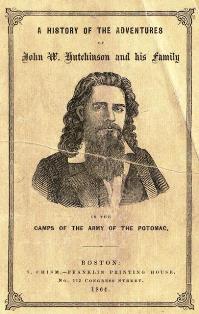
The Book of Brothers: Being a History of the Adventures of John W. Hutchinson and His Family in the Camps of the Army of the Potomac (1864)
By John W. Hutchinson
The Hutchinson Family singers gained widespread fame in the 1840s with their repertoire of political, social, and comic works done in four-part harmony. They are considered by many to be the first uniquely American popular music performers. Although the group’s material included controversial works promoting abolitionism, workers’ rights, temperance, and women’s rights, they maintained their popularity through the Civil War. John Hutchinson himself was also not above singing the family’s praises; this is how he described the benefit concerts his singing family gave for the Soldiers’ Aid Societies:
This proceeding, it may be mentioned, was quite in character with the liberality the Hutchinsons have shown during their career, from the very first. Humanity has never called upon them for aid in vain. They have not only sung of brotherly love, but have exhibited it in their personal efforts to ameliorate suffering among their fellow men. Practice, with them, has gone hand in hand with precept. And now that the dawning of Freedom’s glorious day is seen, soon we trust to brighten ‘more and more unto the perfect day,’ it is but just to the Hutchinsons to state, that the great and glorious Anti-Slavery cause has had few more efficient advocates and workers than they have been.
The Trent Affair: An Historical Retrospect (1912)
By Charles Francis Adams
In this retrospective account, Charles Francis Adams described the international diplomatic incident during the Civil War known as the Trent Affair. Before discussing the specific event, he spoke to an experience universal to every generation that witnesses a historic event.
One living in those times who had then attained even a degree of maturity, that is, any man or woman now over sixty-five years of age, cannot but retain, if American, a distinct recollection of the incident, and a general memory at least of the excitement caused by it, and the intense interest with which every stage of its development was awaited. For such, however, it is necessary also to bear in mind that the present great majority, those of the younger generations, do not have this vivid personal recollection of the events of that memorable period, and there are many whose ideas concerning the affair of the Trent are vague and, to say the least, unsettled.
Adams goes on to describe the events in great detail.
Magnus' Universal Picture Books, Series No. 1-12 (1863)
In addition to wonderful illustrations, this book contains an unusual piece of direct marketing of war-related items on its back pages. Advertised were paper soldiers, maps, bird's-eye views of battlefields, illustrated battle scenes, patriotic stationary, and “Fifty Lithographed Games and Twenty Four Lithographed Picture Books.”
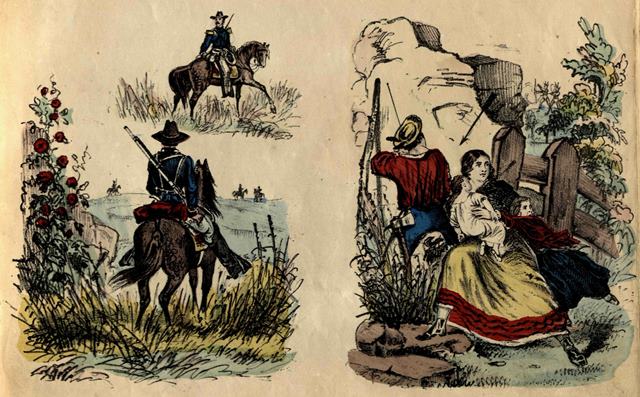
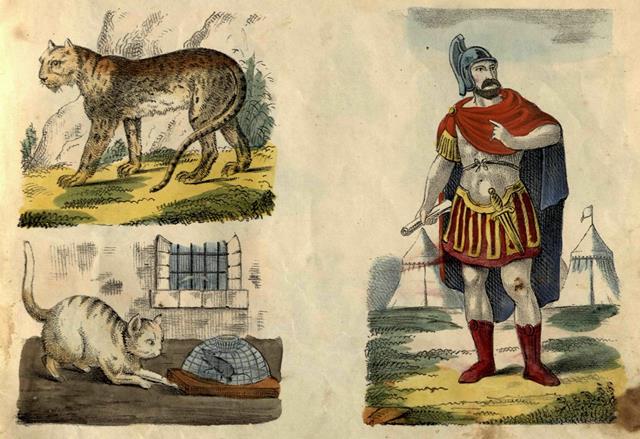
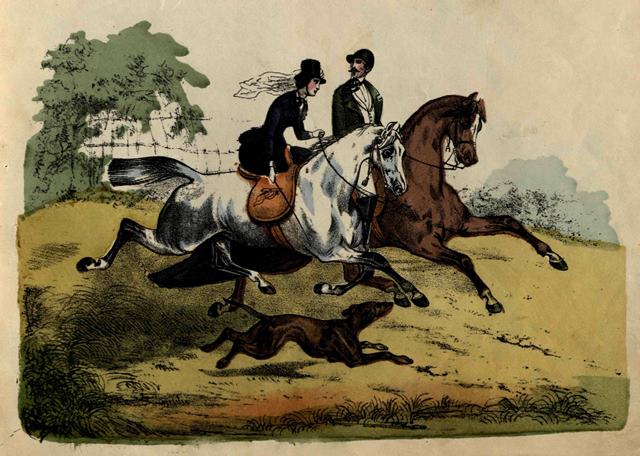
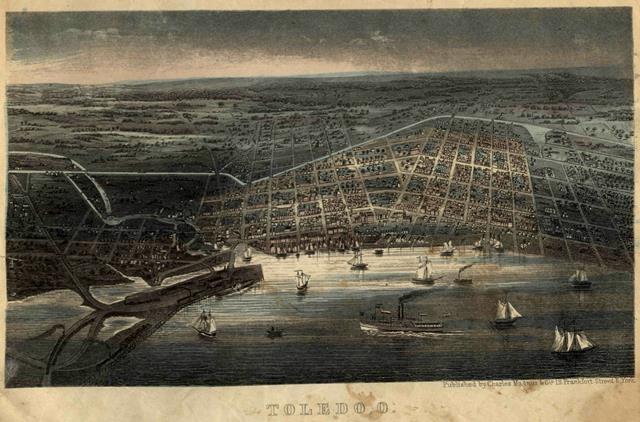
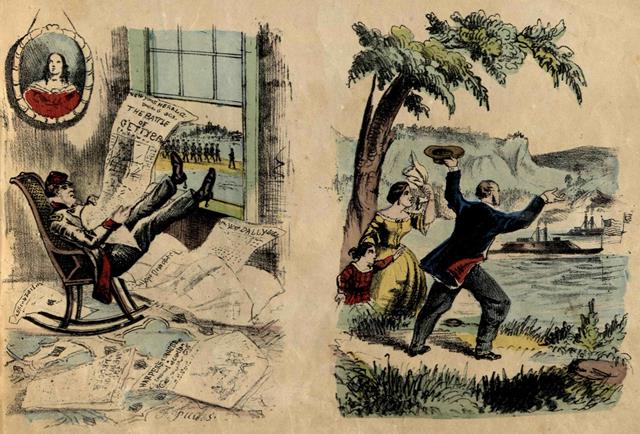
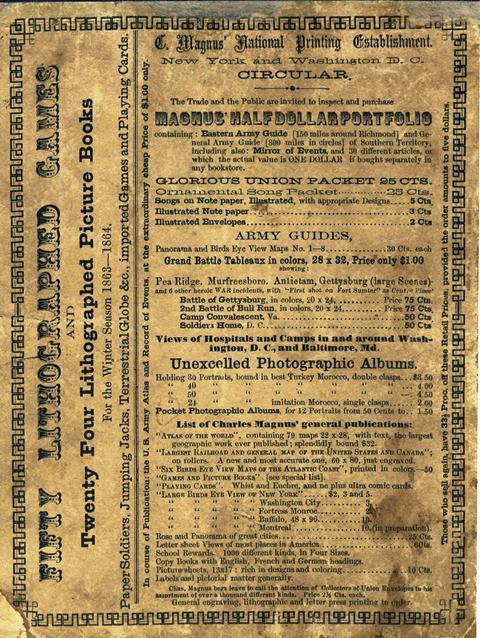
For more information about The American Civil War Collection, 1860-1922, or to request a trial for your institution, please contact readexmarketing@readex.com.



